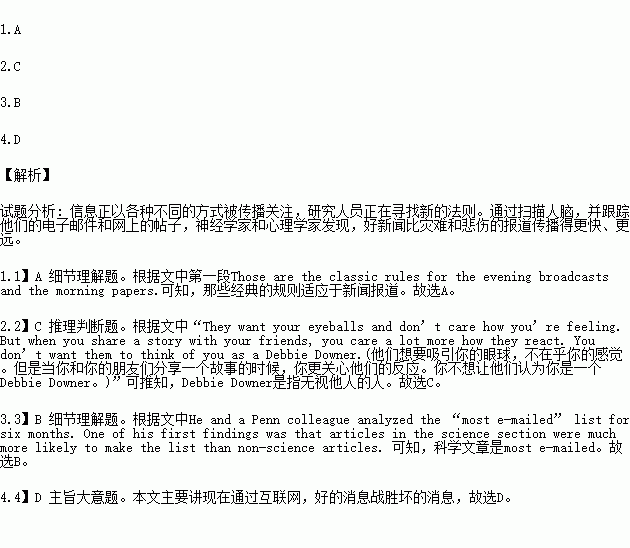题目内容
Bad news sells. If it bleeds, it leads. No news is good news, and good news is no news. Those are the classic rules for the evening broadcasts and the morning papers. But now that information is being spread and monitored in different ways, researchers are discovering new rules. By tracking people’s e-mails and online posts, scientists have found that good news can spread faster and farther than disasters and sob stories.
“The ‘if it bleeds’ rule works for mass media”, says Jonah Berger, a scholar at the University of Pennsylvania. “They want your eyeballs and don’t care how you’re feeling. But when you share a story with your friends, you care a lot more how they react. You don’t want them to think of you as a Debbie Downer.”
Researchers analyzing word-of-mouth communication—e-mails, Web posts and reviews, face-to-face conversations—found that it tended to be more positive than negative, but that didn’t necessarily mean people preferred positive news. Was positive news shared more often simply because people experienced more good things than bad things? To test for that possibility, Dr. Berger looked at how people spread a particular set of news stories on The New York Times’ website. He and a Penn colleague analyzed the “most e-mailed” list for six months. One of his first findings was that articles in the science section were much more likely to make the list than non-science articles. He found that science amazed Times’ readers and made them want to share this positive feeling with others.
Readers also tended to share articles that were exciting or funny, or that inspired negative feelings like anger or anxiety, but not articles that left them merely sad. They needed to be aroused(激发) one way or the other, and they preferred good news to bad. The more positive an article, the more likely it was to be shared, as Dr. Berger explains in his new book, “Contagious: Why Things Catch On.”
1.What do the classic rules mentioned in the text apply to?
A. News reports.
B. Research papers.
C. Private e-mails.
D. Daily conversations.
2.What can we infer about people like Debbie Downer?
A. They are socially inactive.
B. They are good at telling stories.
C. They are inconsiderate of others.
D. They are careful with their words.
3.Which tended to be most e-mailed according to Dr. Berger’s research?
A. Sports news.B. Science articles.
C. Personal accounts.D. Financial reviews.
4.What can be a suitable title for the text?
A. Sad Stories Travel Far and Wide
B. Online News Attracts More people
C. Reading Habits Change with the Times
D. Good News Beats Bad on Social Networks
 名师指导期末冲刺卷系列答案
名师指导期末冲刺卷系列答案Share with us Would you like to have your writing published(刊登) in this magazine? Then let us know! We pay for stories, anecdotes and jokes: |
Anecdotes and Jokes $50 What’s made you laugh recently? A funny sign? A colleague’s behaviour? Got a joke? Send it in for Laughter is the Best Medicine! Email: Juliet@sws.com Smart Animals Up to $100 Send us a story about the strange behaviour of unique pets or wildlife in up to 300 words. Email: audry@sws.com Power of Love Up to $150 Acts of generosity(慷慨) can change lives or just give you that warm feeling full of love. Share your moments in 100—500 words. Email: susan@sws.com My Story $350 Do you have an inspiring or life-changing story to tell? Your story must be true, unpublished, original(原创的) and 800-1000 words. Email: nanjc@sws.com |
1.How much will the magazine pay for a joke to be published?
A. $50.B. $100.C. $150.D.$350.
2.If you want to share a story of your pets with the readers, you need to send it to ________.
A. Anecdotes and JokesB. Smart Animals
C. Power of LoveD. My Story
3.A story showing people’s generosity should be emailed to the editor(编辑) at ________.
A. juliet@sws.comB. susan@sws.comC. Audrey@sws.comD. nanjc@sws.com
4.An inspiring story sent to the magazine should ________.
A. describe strange behaviour B. contain less than 800 words
C. be real and original D. be published before

